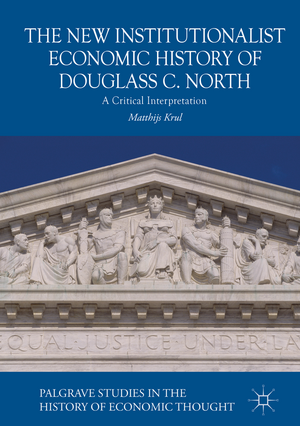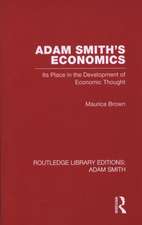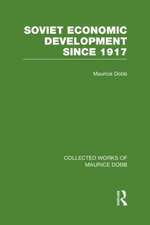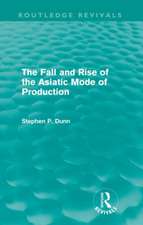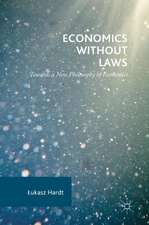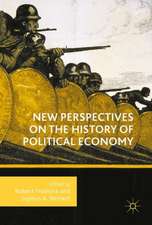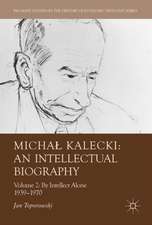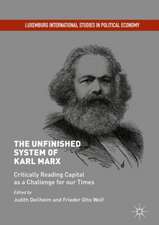The New Institutionalist Economic History of Douglass C. North: A Critical Interpretation: Palgrave Studies in the History of Economic Thought
Autor Matthijs Krulen Limba Engleză Hardback – 14 sep 2018
| Toate formatele și edițiile | Preț | Express |
|---|---|---|
| Paperback (1) | 524.55 lei 6-8 săpt. | |
| Springer International Publishing – 29 dec 2018 | 524.55 lei 6-8 săpt. | |
| Hardback (1) | 699.12 lei 6-8 săpt. | |
| Springer International Publishing – 14 sep 2018 | 699.12 lei 6-8 săpt. |
Din seria Palgrave Studies in the History of Economic Thought
- 15%
 Preț: 640.71 lei
Preț: 640.71 lei - 9%
 Preț: 1053.13 lei
Preț: 1053.13 lei -
 Preț: 143.90 lei
Preț: 143.90 lei - 18%
 Preț: 1003.37 lei
Preț: 1003.37 lei -
 Preț: 447.84 lei
Preț: 447.84 lei - 15%
 Preț: 694.87 lei
Preț: 694.87 lei - 18%
 Preț: 889.75 lei
Preț: 889.75 lei - 18%
 Preț: 788.72 lei
Preț: 788.72 lei - 18%
 Preț: 1003.70 lei
Preț: 1003.70 lei - 15%
 Preț: 708.11 lei
Preț: 708.11 lei - 15%
 Preț: 643.16 lei
Preț: 643.16 lei - 18%
 Preț: 728.28 lei
Preț: 728.28 lei - 18%
 Preț: 730.65 lei
Preț: 730.65 lei - 15%
 Preț: 712.69 lei
Preț: 712.69 lei - 18%
 Preț: 950.66 lei
Preț: 950.66 lei - 15%
 Preț: 692.24 lei
Preț: 692.24 lei - 15%
 Preț: 641.85 lei
Preț: 641.85 lei - 18%
 Preț: 1121.62 lei
Preț: 1121.62 lei - 15%
 Preț: 642.51 lei
Preț: 642.51 lei - 18%
 Preț: 723.66 lei
Preț: 723.66 lei - 15%
 Preț: 477.40 lei
Preț: 477.40 lei - 15%
 Preț: 697.97 lei
Preț: 697.97 lei - 15%
 Preț: 695.85 lei
Preț: 695.85 lei - 18%
 Preț: 784.48 lei
Preț: 784.48 lei - 15%
 Preț: 470.56 lei
Preț: 470.56 lei - 15%
 Preț: 638.89 lei
Preț: 638.89 lei - 18%
 Preț: 736.32 lei
Preț: 736.32 lei - 15%
 Preț: 699.28 lei
Preț: 699.28 lei - 15%
 Preț: 637.78 lei
Preț: 637.78 lei - 15%
 Preț: 640.71 lei
Preț: 640.71 lei - 15%
 Preț: 636.45 lei
Preț: 636.45 lei - 15%
 Preț: 649.06 lei
Preț: 649.06 lei - 15%
 Preț: 637.13 lei
Preț: 637.13 lei
Preț: 699.12 lei
Preț vechi: 822.50 lei
-15% Nou
Puncte Express: 1049
Preț estimativ în valută:
133.78€ • 140.32$ • 111.37£
133.78€ • 140.32$ • 111.37£
Carte tipărită la comandă
Livrare economică 01-15 aprilie
Preluare comenzi: 021 569.72.76
Specificații
ISBN-13: 9783319940830
ISBN-10: 331994083X
Pagini: 230
Ilustrații: XVI, 260 p.
Dimensiuni: 148 x 210 x 24 mm
Greutate: 0.48 kg
Ediția:1st ed. 2018
Editura: Springer International Publishing
Colecția Palgrave Macmillan
Seria Palgrave Studies in the History of Economic Thought
Locul publicării:Cham, Switzerland
ISBN-10: 331994083X
Pagini: 230
Ilustrații: XVI, 260 p.
Dimensiuni: 148 x 210 x 24 mm
Greutate: 0.48 kg
Ediția:1st ed. 2018
Editura: Springer International Publishing
Colecția Palgrave Macmillan
Seria Palgrave Studies in the History of Economic Thought
Locul publicării:Cham, Switzerland
Cuprins
Chapter 1: Introduction: Douglass North's NIEH in Context.- Chapter 2: North's NIEH in Historical Overview.- Chapter 3: Markets, the Social Contract, and the 'Smithian Result'.- Chapter 4: Players of the Game: Rationality, Choice, and Indeterminacy.- Chapter 5: North's Theory of Cultural Evolution.- Chapter 6: North's NIEH as Global History.- Chapter 7: Revisiting Polanyi's Challenge: North and the Limits of the New Institutionalism.- Chapter 8: Conclusion: The Future of the Neoinstitutionalist Turn.
Notă biografică
Matthijs Krul was until recently Research Fellow at the Max Planck Institute for Social Anthropology in Halle (Saale), Germany. He has been a visiting lecturer at Brunel University and the University of Westminster, UK. His work focuses on the intersection between the historiography and the philosophy of economics.
Textul de pe ultima copertă
This book offers a comprehensive assessment of Douglass North’s contribution to economics and the social sciences by examining the origins and structure of his New Institutionalist Economic History (NIEH). Informed by contemporary debates in the philosophy of economics, Krul describes the evolution of North’s theory from mainstream economics to an increasingly heterodox form of New Institutionalism. He also examines what North's original aims were in developing the NIEH research programme and how well it has achieved these aims. By exploring major themes in North's NIEH, with an emphasis on the final stage of his theory, Krul sheds new light on the strengths and weaknesses of North's work. He also discusses the implications of this critical interpretation for the New Institutionalism in economics and other fields of social science.
Matthijs Krul was until recently Research Fellow at the Max Planck Institute for Social Anthropology in Halle (Saale), Germany. He has been a visiting lecturer at Brunel University and the University of Westminster, UK. His work focuses on the intersection between the historiography and the philosophy of economics.
Matthijs Krul was until recently Research Fellow at the Max Planck Institute for Social Anthropology in Halle (Saale), Germany. He has been a visiting lecturer at Brunel University and the University of Westminster, UK. His work focuses on the intersection between the historiography and the philosophy of economics.
Caracteristici
Uses North’s work as a case study for problems that affect the New Institutional Economics school more generally Addresses problems for the applicability of economic theory, specifically New Institutionalist theory, to the historical and social sciences Compares the approaches of North and Polanyi to New Institutionalism
